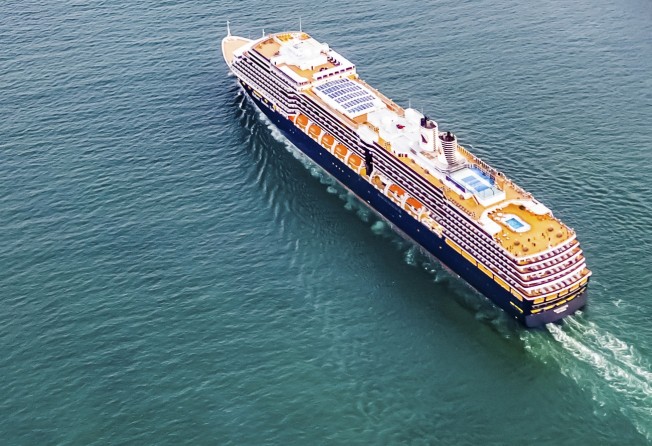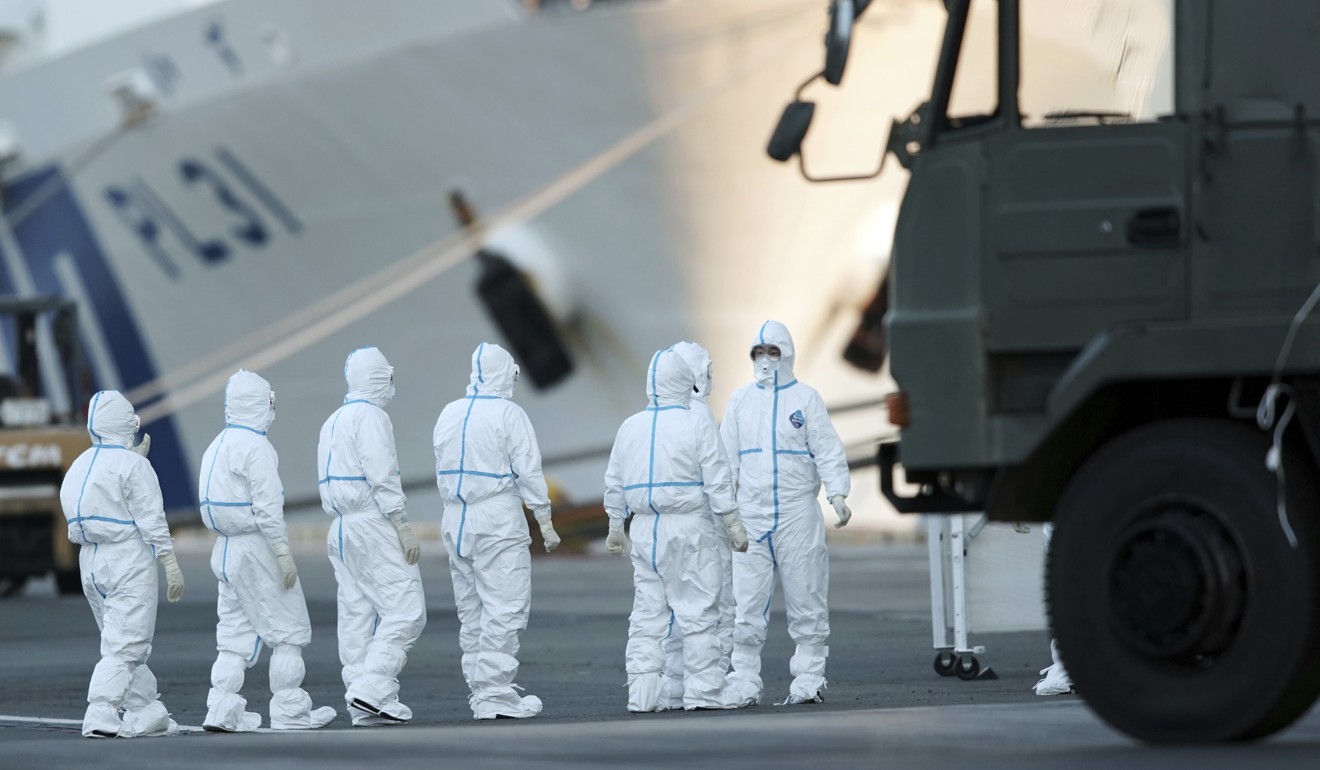Captain just announced US, Canada, Great Britain and the Netherlands governments are working on our behalf to find us an entry port. No confirmation about Bangkok tomorrow. #westerdam
— Lydia Miller (@Pebblecovefarm) February 12, 2020
Coronavirus: anxiety mounts on Westerdam cruise ship, set adrift over outbreak fears
- Holland America cruise ship has been turned away from five ports, despite there being no evidence of coronavirus infection on board
- It will now be allowed to dock in Sihanoukville, Cambodia, on Thursday morning

When cruise passengers first boarded the MS Westerdam, they thought they were in for decadent dessert buffets and nightly appearances by a magician. Instead, the 2,257 passengers – mostly from the US, Canada and Britain – and crew on board the Netherlands-flagged vessel have faced days of uncertainty adrift on the sea after being refused entry by five different ports.
The ship, operated by Carnival Corporation’s Holland America Line , set sail from Hong Kong on February 1, planning to dock in Yokohama two weeks later, but was denied entry to Japan, Taiwan, the Philippines and Guam before Thailand’s Health Minister Anutin Charnvirakul on Tuesday announced it would also be refused permission to dock in Laem Chabang port, about 50 miles east of Bangkok.
On Wednesday evening, Holland America Line confirmed that the ship had been granted a port of entry in Cambodia, and will arrive in Sihanoukville on Thursday morning.
This came after rumours circulated on Twitter of an announcement by the ship’s captain that international health authorities, as well as the governments of the US, Canada, Britain and the Netherlands, were working together to find a port of entry.
Stephen Hansen, a passenger travelling on the Westerdam with his wife, said patience was wearing thin among those on board.
“We are no longer just a group of inconvenienced travellers,” said Hansen by email. “If we don’t dock soon we will start running low on food, fuel and medications. Our governments need to step in and work with Asian countries to find a solution. The crew and [cruise operator] Holland America are doing all they can, but this is a political situation as well as a health one.”
The cruise ship could have been forced to wait until it was in distress – running out of water, food or fuel – before international law-of-the-sea conventions kicked in and legally obliged the closest country to admit the vessel or provide help, Jean-Paul Rodrigue, a professor of transit geography at Hofstra University in New York, told Bloomberg News.
Thailand’s Deputy Transport Minister Atirat Ratanasate said in a Facebook post on Tuesday that the country “will gladly help providing fuel, medicine, and food” to the ship, without providing further details.
The cruise industry in Asia – which had enjoyed a tripling in capacity to 4.26 million passengers between 2013 and 2018, according to trade group Cruise Lines International Association – has been roiled by the outbreak of the deadly new coronavirus, which was officially name Covid-19 by the World Health Organisation on Tuesday.
I was on the Westerdam up to Hong Kong. HAL knew days prior to HK there were problems with coronavirus. We stayed extra days in Vietnam & cancelled HK hotel prior to arriving 1st Feb. The onward cruise should have been cancelled.
— Betty Taylor (@bettsie2u) February 8, 2020
Another ship owned by the same corporation as the Westerdam, the Diamond Princess, has been quarantined in Yokohama with 174 cases of Covid-19 detected, leaving the ship’s 3,700 passengers mostly confined to their cabins. Elsewhere, a World Dream cruise ship docked for five days in Hong Kong after three cases were linked to the vessel, though all passengers and crew later tested negative for the virus and disembarked.
Holland America, owned by Miami-based Carnival Corporation, said in a statement that there was no reason to believe there are any cases of coronavirus on board the Westerdam.
“We are aware of the reports regarding the status of Westerdam’s call to Thailand,” said the statement. “We are actively working this matter and will provide an update when we are able.”
Thai Health Minister Anutin Charnvirakul questioned on Wednesday whether Carnival Corporation could be sure that there is no reason to believe there are any coronavirus cases on board. “We must think about the safety of our people,” Anutin said. “We’ve been told that there are no cases of infection on the ship, but how can we be sure?”
When the Westerdam is allowed to dock, health experts say it is likely that passengers would be kept aboard the ship for another two weeks, the longest estimated incubation period for the virus, to make sure there were no infections.

But WHO officials have said the appearance of any new cases, such as has happened with the currently quarantined Diamond Princess, could restart the 14-day clock – keeping those on board in limbo for even longer.
Jennifer Nuzzo, senior scholar at Johns Hopkins Centre for Health Security in Washington, said keeping passengers confined to close quarters could risk infection spreading further, or outbreaks of other illnesses.
“People are increasingly concerned about the human rights of the individuals on board,” said Nuzzo. “Our standard for action should always be to protect public health first, but when we see things like lockdowns of whole cities that may impede transport of medical supplies, or whole boatloads of people confined together, we have to ask: we are taking these measures at what cost?”
On board the Westerdam, with no signs of the virus, cruise life has mostly continued as normal, Hansen said, with passengers trying to stay positive despite the uncertainty.
A group of us have formed the #Westerdam cycling club and meet every morning for a rigorous spin workout led by the ship’s upbeat fitness instructors. We’ve probably rode hundred of nautical miles together. The muesli in the Lido buffet is lovely, I wish I’d tried it sooner.
— Christina Kerby (@ChristinaKerby) February 10, 2020
After previous confrontations with outbreaks of norovirus, the cruise industry has developed protocols to prevent infections aboard ships.
But in order to repatriate passengers, “they’ll have to first be quarantined”, said Eric Feigl-Ding, epidemiologist and health economist at the Harvard Chan School of Public Health, who noted that unfortunately “there’s a NIMBY-ism going on” in reference to the phrase “not in my backyard”. The feeling is particularly strong in Japan ahead of preparations to host the upcoming Olympic Games, he said.
The best option, according to Feigl-Ding, would be for the cruise ship passengers to be quarantined on a military base until they have passed the 14-day incubation period of the virus.
Many of the passengers on board the Westerdam are US nationals, and the situation could affect the number of American travellers taking cruises in future.
Candyce Stapen, a family travel expert at Frommer’s Travel Guides, said the current outbreak will have a big impact on the industry, especially after families have been refused refunds on planned trips because more affordable insurance options only cover “medical emergencies incurred, not feared”.
“Families are likely to cancel travel where there are large groups in close quarters. It only takes one ill person to create a problem,” she said.
Meanwhile, Kyle McCarthy, co-founder and editor of holiday planning site Family Travel Forum, said that recently, people on her site had been searching for holiday ideas closer to home.
Covid-19 has so far killed more than 1,100 people – all but two in mainland China – and infected more than 44,000, including 319 in 24 other countries and territories.